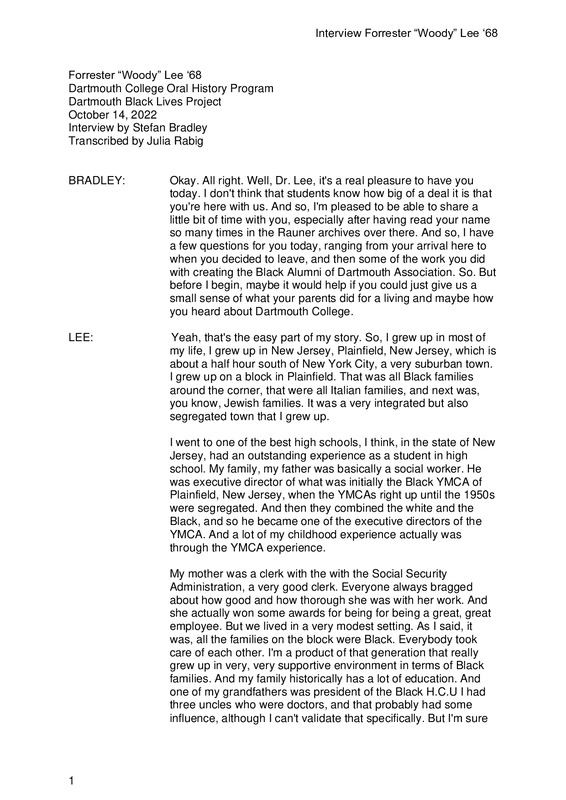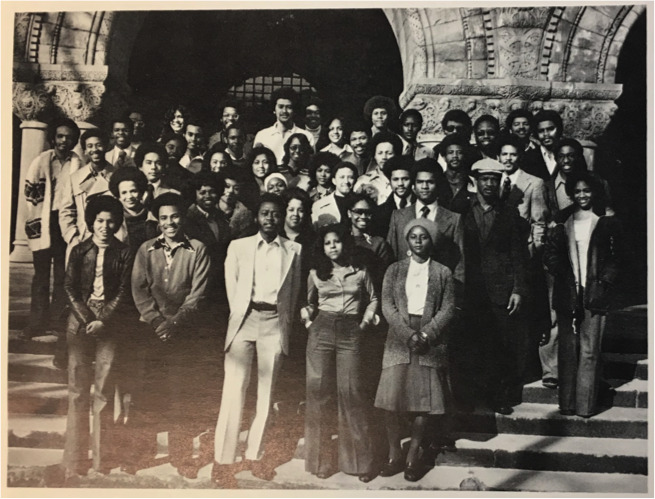Self Work is Not Selfish
The Struggle Around Him
The time of Mr. Noel’s Dartmouth attendance, the late 1960s, was marked by intense racial upheaval (Bradley, 2018). The class of 1968 had the largest number of Black students that the college had yet seen, starting at fourteen and dwindling down to seven by graduation. He was on campus during the inception of the Afro-American Society, founded by two of his peers, Woody Lee '68 and Wally Ford '70 [Interviewed by Dartmouth Black Lives]. George Wallace, a white supremacist who was the 45th governor of Alabama, visited campus twice. The second visit occurred in 1967, during Noel’s junior year, and was subject to a protest led by the Afro-American Society. During the governor’s speech, Black students chanted “Wallace is a racist.” A large group of protestors surrounded Wallace when he tried to leave campus, some pounded on his car roof and rocked his car back and forth (DHASRP, 2021). Mr. Noel was absent for the George Wallace protest and other Afro-Am initiatives. Instead, he was focused on his upward academic climb, which was his own unique role in the struggle for racial justice on campus. For more information on initiatives pioneered by Woody Lee of the Afro-American Society, find the transcription to the interview of Dr. Lee, class of 1968, here:
"... we had the political action arm of the Afro-Americans Society. So, they did all the planning. We just knew something was going to come off. We didn't know what was going on. And it turns out they planned it."
- Dr. Woody Lee on the George Wallace protest
His Role in the Fight
Much of Mr. Noel’s time at Dartmouth was consumed by his studies. He did not subscribe to the idea that all Black people need to be on the frontlines of the Civil Rights struggle and prioritized his own upward trajectory. He noted how one professor in the department of economics, Dr. William L. Baldwin, changed his life by inviting him to participate in a research project at the Department of Justice. He was working towards a spot in the “3-2” program at the Tuck School of Business. This would allow him to graduate from the college after three years and begin pursuing an MBA during what would have been his senior year. He was the fourth Black student to ever attend Tuck, graduating in 1969. Mr. Noel stated that, due to the smaller class size, there was less racial hostility in the business school because there would have been less tolerance for it. After leaving the Tuck School of Business with his MBA, Mr. Noel graduated from Harvard Law School with his juris doctor in 1972. In 1977, Noel became the first African American partner in Holme, Roberts & Owen. He founded his own law firm, the Noel Law Office, in 2002. He recalled in the interview that he was tired, at last, of being a pioneer in the legal world and decided to become his own boss. Noel has practiced for over thirty-five years, specializing in commercial litigation and employment law.
"A white professor changed my life. I had a professor, [Dr. William L] Baldwin, in the economics department, asked me to write a paper with him. In the summer of 68, I went to the Justice Department, spent a month doing research in the Justice Department, came back up to the college and helped him write a paper."
- Edmond Noel
The Ambiguous Look of Progress
Mr. Noel’s description of how his ambition manifested itself differently from those of his peers shows that forward movement does not have to look one particular way. Black people can uplift our race in a number of forms, all of which are valid. His talk of his priorities compared to other Black students at Dartmouth urges listeners not to feel discouraged if your progress looks different from somebody else’s. Just as his progress appears different from that of his ancestors, it diverged from the work of his peers.
"I've tried to say throughout this interview that if we aren't prepared to optimize our positions in any number of different pursuits and any number of different strategies and approaches, we miss out on opportunities. So no, not everybody needs to be a demonstrator. And not everybody needs to be on a school board. But we need to make sure we've got somebody placed all over the place."
- Edmond Noel




